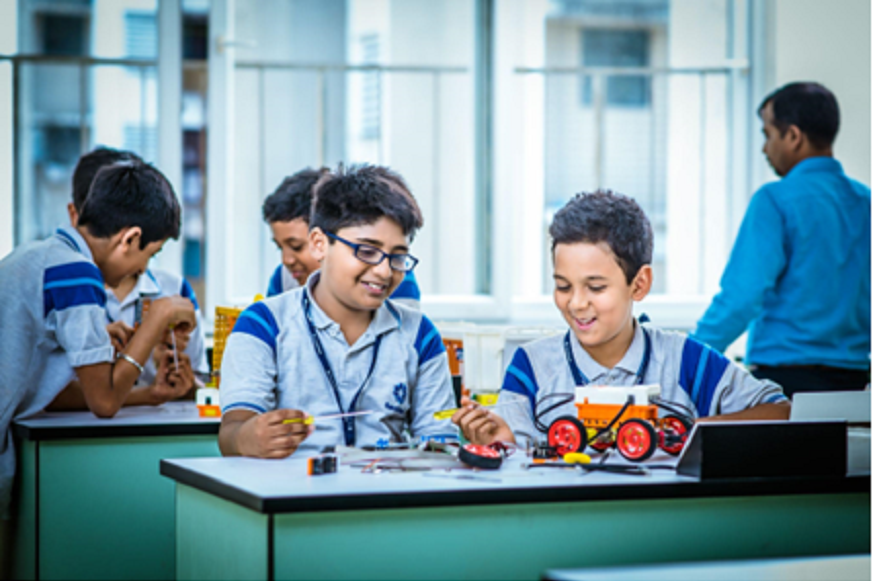Technology has changed the way we live. India is estimated to have more than 900 million (90 crores) internet users by 2025 and 1 billion smartphone users by 2026. Indians are the 2nd largest population on the internet today. Every second, 3 new Indians are joining the internet. In 2015, India’s global ranking in terms of per capita data consumption was around 122. In 2022, we were number one in the world in terms of per capita data consumption. India consumes more mobile data than the USA and China put together. A majority of this data consumption is contributed by our young citizens.
Easy and widespread access to technology has also led to an exponential rise in digital transactions. These transactions can be in terms of e-commerce, digital payments, online banking, etc. Indians did 48 billion digital transactions in 2021, which is 41% of the world’s real-time transactions.
Children of today are exposed to technology from a very young age. Toddlers fiddling around with an iPad or a laptop is a common sight today. As a result of an increasing trend towards nuclear families, working parents frequently take refuge in technology to keep their children engaged during their work hours. As a result, children today are quite well versed with technology even before they join the school. According to a report, over 85% of young kids have a data-enabled smartphone of their own. Beyond smartphones, children also access the internet using other devices such as laptops and tablets. Most reputed schools, such as Euroschool and Eurokids, leverage technology right from the pre-schooling stage.
It is estimated that children on average spend more than 5 hours on the internet. This time is typically spent on activities such as social media. Apps such as YouTube, Whatsapp, TikTok, Instagram, and Facebook are extremely popular among children. These applications provide instant entertainment at the click of a button and have infinite scrolling. This means that children can keep scrolling for content and it will never run out of content. The algorithms of such applications are designed to show content which children love.
As a result, it sometimes leads to addiction with children spending hours just browsing without much mental or physical activity. This phenomenon leads to significant positive and negative impacts of technology on children.
In this blog, we will bring out the positive and negative impacts of technology on children and its effect on their overall development. We will also talk about some tips for parents on how to manage their children’s use of technology responsibly.
Also Read: https://www.euroschoolindia.com/blogs/advantages-and-disadvantages-of-online-learning/
The negative impact of technology on kids
Exercising the Need for instant gratification
Technology in many ways has made our lives easier, more comfortable and more convenient. With just a click of a button we can do so much today – order food, watch a movie, do shopping from the comforts of our homes, engage with friends and colleagues, transfer money, call a cab, and so much more. However, excessive dependence on technology for children develops in them a sense of instant gratification. This leads them to lack patience and an insistence to have everything here and now without necessarily putting in the required efforts and diligence. If they don’t get what they need, the need for instant gratification lends them to anxiety, irritability and stress. This could be a big hindrance in their future as they may not get everything with the click of a button.
Mental and physical implications
Technology allows us to access anything or anyone across the world no matter where we are and what time it is. Today, there is no express need for children to venture out to multiplexes, playgrounds, or their friend’s places or to the market for anything. Mindless scrolling on social media or binge-watching web series or compulsive shopping on e-commerce platforms puts both their bodies and brains to rest for long periods. Both their bodies and minds can go ‘dormant’ with hours of inactivity every day while browsing the internet. This leads to significant implications such as – impaired thinking ability, health issues such as obesity, vision impairment, etc and social isolation.
Another extremely popular avenue for children is online games such as Call of Duty, Valorant, Need for speed, etc. Online gaming can help children develop their cognitive faculties and responses. However, engaging in immersive video games, especially those based on violence, for long durations not only has physical health implications but could also hurt their mental state.
Another prominent implication of social media among children is the increasing instances of cyberbullying and harassment. While on the internet, children can be susceptible to anti-social elements which might cause them mental stress and anxiety.
Reduced academic rigour
The internet has truly democratised education with platforms such as YouTube, Google and numerous EdTech platforms spreading access to education far and wide across India. The use of technology has transformed the classroom. However, it does not come without a significant downside. Students frequently resort to Google, and now other AI-based tools such as ChatGPT, to look out for any answers they can’t find on their own. Students resorting to copying assignments from the internet has become a common phenomenon. While it has its positives, the harm it does is much more significant. Easy availability of ‘answers’ demotivates them to take efforts to work out or figure out the answer on their own. This eliminates any need for thinking or exercising their brains.
Reduces attention span
The dynamic world of technology with its infinitely vast internet, millions of websites, social media apps, web series and video games are all vying for our children’s attention. All of this is on one small screen of a smartphone, tablet or laptop. The all-pervasive social media FOMO (Fear of Missing Out) makes children flip vigorously across WhatsApp to YouTube to Instagram to Twitter and then again back to WhatsApp. The notification ‘things’ even in the middle of the night possess the power to wake children up from deep slumber. All this internet hustle and bustle significantly reduces attention spans among children. The short video format popularised by TikTok is a real manifestation of this phenomenon.
Reduction in attention span is a well-established phenomenon. Excessive usage of technology is one of the root causes of this reduction. Reduced attention span compromises children’s ability to focus and concentrate while in class or even while on the playground.
Diminishing traditional skills
The pervasiveness of technology has led to the near extinction of traditional skills such as handwriting, outdoor sports, and interpersonal skills. Most children today prefer typing on a keyboard instead of writing with a pen or a pencil. They prefer online gaming to outdoor sports such as cricket and football. They like messaging on WhatsApp instead of having a face-to-face conversation. All these changing phenomena are leading to the near extinction of some of these very critical life skills.
Positive impacts of technology on kids
The presence of technology in a child’s life is however not all bad news! Considering the pace at which technology is evolving, its presence has demonstrated benefits of technology on kids contributing to their growth and overall development too.
Heightened creativity
Children are now equipped with computers, I-pads and laptops much before they enter school. The positive impacts of technology are seen early on. It not only prepares them with the technological skills to explore the capabilities of the devices but also exposes them to the possibilities these devices offer for their future growth and development. Access to games, maps, and puzzles enhances their multi-tasking, creativity, innovation, problem-solving, decision-making, and co-creation skills.
Improve Socialisation skills
Children can network and connect with children and mentors from across the world. Technology allows them to stay connected with friends and family who live far away. Thanks to the internet and technological tools such as Snapchat, and messengers, children can communicate far and wide more than ever before and hence develop better relationships while finding better opportunities for themselves too.
Enhanced Learning Experience
Virtual reality has given rise to the availability of 3D models and videos which allows them to explore their creativity which was not possible a few years ago. Online games, simulations, and quizzes supplement their learning and provide different levels of personalization. Individualised monitoring and evaluation mechanisms are tailored and delivered for their individual needs making learning fun, interactive and valuable.
Tips for Parents to help children manage the use of technology
Like every significant invention, technology also has its pros and cons. The key is how parents can help children leverage the benefits of technology and prevent them from overdoing it and getting into adversities. Parents need to start having open conversations about the benefits of technology on kids and the consequences of the overuse of technology. Below are some tips:
The schools in India, such as EuroSchool, are renowned for offering exceptional educational experiences. These institutions combine cutting-edge teaching techniques, world-class infrastructure, and a committed faculty to deliver holistic development for students. As a result, they prepare students to excel in their chosen fields and contribute as global citizens.










